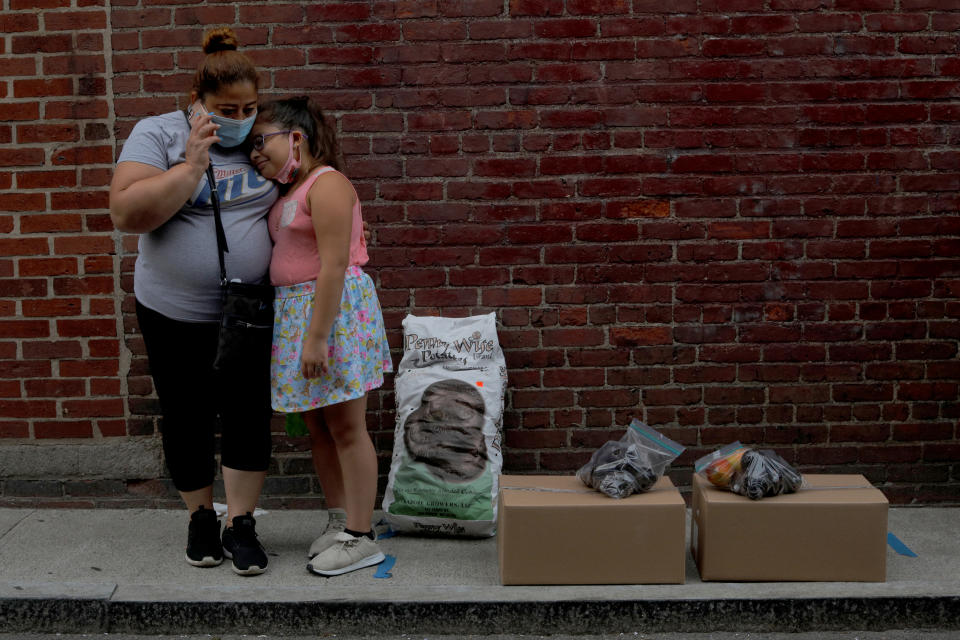Here's why the pandemic economy is hurting some Americans while helping others: Money, Honestly podcast
The coronavirus pandemic and its economic fallout are affecting Americans differently — largely depending on where they fall on the income scale.
Many of those who kept their jobs and worked from home increased their savings and saw their retirement portfolios and home equity continue to rise. Others, who bore the brunt of layoffs and furloughs when states shut down this spring continue to struggle without jobs and depleted savings, especially as key government aid runs out.
Cashay Editor Janna Heron discusses this dichotomy in the economy with Yahoo Money and Cashay jobs reporter Denitsa Tsekova and housing and retirement reporter Dhara Singh in the latest episode of the Money, Honestly podcast.
The podcast episode is based on earlier reporting Denitsa and Dhara both did for the Yahoo Money and Cashay.

Janna: Hi. This is Money, Honestly. I'm Janna Herron, and joining us today are Dhara Singh and Denitsa Tsekova, reporters on my team at Yahoo Money and Cashay. We'll be talking about how the economic recovery from the coronavirus pandemic is different for lower-income Americans and higher earners.
So let's go back to the spring, when this pandemic really took hold. At that time it seemed like a lot of people were feeling the economic pain from both that and the ensuing shutdowns across the country. So for background's sake, what happened then, and how did it affect Americans?
Denitsa: Well, I would say in the beginning of the pandemic, everyone felt the hit of it. The stock market was plummeting, people were losing big chunks of their income. Then at the bottom, you see a lot of people losing their jobs, being laid off. Initially there was no additional unemployment benefits. So there was a lot of uncertainty, and the financial struggle was real for every income bracket.
But what we slowly see as the economy and people recover is that the recovery is not as even as the initial hit. We see that high-income earners, their stock portfolios are back, house prices are rising, and they're closer to where they were before the pandemic or maybe even better-off. While we still have a really high unemployment rate, we have 27 million Americans who are currently unemployed and receive unemployment benefits, and those people are really struggling. Actually for some of them, it may be getting worse now because one of the protections under the CARES Act are expiring. So for them, the recovery may take months and years. While for high-income earners, we see some people that have already returned to where they were.
Janna: So, let's break this down a bit. You talked about stock portfolios. So let's talk about the stock market. Like you said in the beginning, we saw it plummet. Very scary, people probably worried about their retirement savings. But now, it's at new highs. You have the S&P 500 recently eclipsing its February record, and it appears to not be stopping on its way up. So what does this mean, and who has this helped?
Dhara: This has definitely helped predominantly, from the economists we've talked to, kind of your rich, white Americans, to be honest. A lot of the wealth is accumulated in that top 10%, and who this really leaves behind is actually a lot of minorities. There's some statistics out there that show that 98.4% of black Americans actually don't own any stocks at all. And it's just, as the S&P grows, these people are going to be left behind in the stock market, in this wealth accumulation, as well as other areas.
Janna: Right. Then if they try to get in while the stock market is at highs, more of their money is going to buy those stocks that people got at a much cheaper price before. Dhara, do you know what ... With 401(k)s, that's a big way people are in the stock market, is who has 401(k)s and who doesn't.
Dhara: Yes. So believe it or not, a lot of people in, let's say, the service industries, they might not have 401(k)s. You're really looking at people who still have their jobs, who are in corporate America. Let's say they work at banks, they work at these top industries. But since the majority of people, as Denitsa has really laid out in previous articles, since they belong in the service industry, these are people who are going to be missing out on getting that employer match during the pandemic.
Janna: Right. Right. Let's move to housing, which is another area of the economy where things have rebounded really quickly. Dhara, can you tell us what is happening there? First, what happened during the pandemic? Like in April, what happened with housing, where it is now, what's driving it, and who is this helping?
Dhara: Yeah. When forbearance protections were passed, we saw really an unprecedented amount of people delaying their mortgage, deferring their mortgage. And they had up to 180 days at a time. So up to 360 days total to delay their mortgage payments, if it was backed by a federal agency, such as Freddie or Fannie. Fannie Mae. But after this, it turned out we also have a bunch of Americans who have accumulated a lot of home equity in their homes. We're seeing an all-time high of 6.5 trillion during the pandemic. It's so interesting, because on the one hand you have all these Americans who are struggling to pay their rent, are struggling to pay their mortgage. But then you have a handful of Americans who are stable in their jobs, who have so much wealth accumulation in their homes, and can really tap into it. So, you kind of see a big gap in housing wealth.
Janna: And, I mean, housing wealth. Why is that important? What does that mean for an American, if you have that wealth?
Dhara: Yeah. So let's say there's a couple living in a home together, and one of them loses a job. Well, they do have to make their paycheck stretch thin. They might have a lot of debt expenses and things of that nature. So by tapping into your home equity, let's say you want to take a cash-out refinance, you can take some of that wealth that's built up in your home and use that to pay off your debt. Because you've already accumulated that wealth, it's just an extra safety cushion. This is obviously only available if you do have a home, and it's also available, I would say, if someone has a job in your home too. Because if you have lost your job, you essentially can't even really tap into your home equity.
Janna: And then about like 35% or so, I'm just kind of spit-balling here, of Americans don't own their homes. So they're renters, and here they are during a pandemic, and home prices are rising, probably confoundingly enough for them, and that making it harder for them even to get into a home if they wanted to buy one.
Dhara: Yes. There's a statistic out there that shows that basically if the median net worth of homeowners is around 231,400, 231,000, and that of renters is 5,200, you have a huge gap. And a lot of renters, most of their paycheck goes towards renting. So as home values go up and these people who are very rent-burdened, it's just making them even harder to buy a home. Now we're in an era where housing supply across the nation is short by like 2, 3 million units. And this was way earlier in the year, so who knows what it is now. There's so many obstacles preventing people from buying a home. Affordability is one. People losing their jobs. And then, yeah, just the supply there.
Janna: Now I want to turn to the savings rate. Denitsa, this is something that's been interesting because it's remained really, really high during this time of economic uncertainty. I can imagine some people who still remain employed, like, for example, me, are able to sock away more money during this time because we aren't dining out as much. If at all. We're not going on big trips to Europe. We're not doing other entertainment stuff, like concerts or sporting events that cost money. So, I'm saving money. But what else is behind the savings rate, and are you seeing a difference between higher earners and lower-income Americans?

Denitsa: Yeah, for sure. As you said, the saving rate is still very, very high. So currently it's 17.8%, which we have to say it's down from, I think the highest was 19%. So, it's going down. But a lot of people are saying that we have a high savings rate. That mean that a lot of people have a lot of money that is not spent in the economy. But I think when we're talking about savings rate, we really have to break down this by income bracket. While we don't really have the data of which income bracket is saving how much and what their specific saving rate is, we do know ... We had great data. It was from J.P. Morgan, and it was breaking the spending by low-income, middle-income, and high-income earners.
What we saw throughout this pandemic is that high-income earners are not spending nearly as much as they did before the pandemic. As you said, a big part of this is discretionary spending. So, they don't go on vacations, they don't fly, they didn't go to as many restaurants. Restaurants are opening just now. It's smaller capacity. So they don't really spend that much money, and maybe they have much more savings than they did before. But it seems to be the high-income learners that are driving that savings rate. And we can say that it's, "Oh, low-income earners have plenty of savings."
Another evidence for that is, we really saw a lot of data on how the stimulus checks were spent. And what you see is the lower you are in the income ladder, the more of your check has gone to bills, has gone to supporting your family, and just basic necessities. Then the higher you go, you see that people tend to have saved a little more.
So my point is, the fact that we have high savings rates doesn't mean that low-income earners have savings. What I've heard from economists is that we probably see the similar inequality in the savings rate, where high-income earners have saved more while low-income learners are struggling. Especially now during the pandemic, we have unprecedented government support. Really high unemployment benefits, stimulus checks. And this has expired, and now there is very limited government supports. So, it's a difficult time for low-income earners.
Dhara: Me and Denitsa, we were talking to different types of people. She had really looked into someone who was on the lower end of income scale, and I looked at someone who is on the higher end of the income scale. It was so interesting to see that, yeah, both of them had their own unique struggles during the pandemic. But obviously the person that I interviewed, Marissa Friedman, the more I talked to her, I realized that she had already had properties under her belt. Her husband had a job too during this pandemic. So when her business was failing, even though she was able to navigate, and start a new business that became profitable, and kind of saved herself during the pandemic, she already had all this cushion. So even whether you're a low-income earner or a high-income earner, the recovery is going to look really different for both of you.
Denitsa: I think I remember from the story, Dhara, that she even talked about how much money she was able to save because she wasn't going out to eat, and because she wasn't doing work lunches, and things like that. Right?
Dhara: Yeah. So basically she was saying that she was saving a couple thousands of dollars just by not eating out with her friends and things of that nature. And this was on a monthly basis. What was so interesting from her anecdote was that she, from the very beginning, even though she had all this financial support, she lived in a townhouse in California, and she saw her friends who had moved to wealthier houses kind of downsize. So it was just a very interesting experience for her to see that all her friends who had bought these big homes downsized as they were struggling during the pandemic while she stayed in her townhouse, accumulated over $500,000 in equity over the years, and has really been in a stable position.
Janna: Right. And then, Denitsa, you interviewed someone who lost a job in the restaurant business, I think. Right?
Denitsa: Yeah. Yeah. She was working in ... Yeah.
Janna: All right. And her savings situation was a lot different.
Denitsa: Yeah. So what she told me is that she hardly has any savings now, and she used to get the 600 under the CARES Act. That was supporting her income very well throughout the pandemic, but now she doesn't get them. And she gets very little unemployment benefits. I think the total is around 300-and-something a month. So, and-
Janna: That's very little.
Denitsa: Yeah. It helps her cover only a small part of her rent, so it's a very difficult situation. So she's going to use the rest of her savings to try paying the rent for September, and then she'll see how things are from now on. But yeah, we see a clear example of maybe some of those low-income, middle-income people saved some of the money. But with the additional benefits expiring, they're probably going to spend that savings that is already very limited on next month's rent, or the bill for next month because they suddenly saw a big squeeze in their income.

Janna: Right. Right. So again, what we're trying to highlight is we see some of these narratives that show that our economy's doing better when you're looking at the stock market, you look at housing crisis, the savings rate. These all on the surface seem like very, very good things, very positive things for the economy. But just because that's happening, that doesn't mean, as you guys are pointing out, that all Americans are being lifted from these things. You just have to really look at the unemployment rate and the jobless claims every week to know that there is definitely many Americans who are still struggling. And Denitsa, you talked to a couple people, experts, that really showed how the people are struggling now is different from past recessions.
Denitsa: For sure. So one thing about unemployment is, we still haven't recovered 60% of the jobs that have been lost since the start of the pandemic. So the recovery there is not even halfway through. We have a very long way to go. And what we see is, in this recession compared to other recessions, here the servicing industry was hit immediately and very hard. Which, from what I've heard from economists, usually it happens that manufacturing and construction are hit very hard in previous recessions. The difference is that manufacturing and construction generally holds jobs that are a bit more high-paying. While here we got, in the service industry, we've got a lot of low-income people working into. So them losing jobs is a very difficult situation and hit for low income earners.
Another thing we see is that that service industry sector is really hard to recover, because we still have a public health crisis. And for any service sector, that's a very big thing. They can't fully return to what they were until we're out of this public health crisis. Another thing that we see is, we see very different unemployment rates for whites, blacks, and Hispanics. So for black, the unemployment rate is 14.6%. For Hispanic, it's 12.9. And for white workers, it's 9.2. So, a really huge difference and uneven distribution for unemployment.
Janna: So we're seeing this divide between those who are recovering and those not. Not just from an income point of view, but also there is a racial or ethnicity component as well.
Dhara: Yes. Even if you look at the Federal Reserve data, the distribution of household wealth, you see that as of this year the latest data is showing that 80.4% of the real estate goes to white Americans. Then for black Americans, that number is only 5.3%. For Hispanic, that number is only 5.1%. So, it's just a really big gap.
Janna: Yeah. So this is a gap that existed already, and now this pandemic and the economic ramifications from it is only making it worse. So if I'm looking forward at this income inequality that the pandemic is exacerbating, what do experts expect as we go on, and we struggle through this pandemic, and wait until we can get past this crisis?
Denitsa: Well, I spoke one economist who actually, she worked at the Federal Reserve for a very long time. She was specifically looking at personal income and wealth distribution. While we don't have the data for the second quarter, she told me that it's very likely for us to see wealth inequality increase, and for the reasons we talked about. High-income earners, wealth is increasing due to rising stocks, home prices. While low-income earners are getting into even more difficult positions with expiring government support and still very high levels of unemployment.
So yeah, we can see really big inequality. But there is another thing that is important, that maybe this is preventable, or at least creating a gap between high-income earners and low-income earners can be reduced if there is more government support. We really saw very high personal income levels in the second quarter. Even as the GDP was shrinking, all government economic indicators were really negative. But we actually so people being in a good state in terms of their income. So that said, it may take low-income earners six months or an ear to recover. We see a lot of people who may remain in longterm unemployment.
So for those people who either can't find a job, or are maybe at a high risk and can return to their job, what can prevent them from losing even more wealth and being in an even more unequal position in society is to have more government support. While for high-income earners, as I've said, they've pretty much recovered. And some of them, even the person we interviewed for the stories, they're already gaining more wealth than they did before the pandemic.
Janna: So let me talk about the government support, because both of you have been covering this in different aspects. So Denitsa, I know you've been looking at a new round of stimulus checks, if that's going to happen. Also expanded unemployment benefits, since they expired at the end of July. Then Dhara, you've have been looking at eviction and foreclosures, and some moratoriums on those for renters and homeowners. So starting with you, Denitsa, can you give us the rundown on what's happening in the government support for stimulus checks and unemployment? Then Dhara, follow up on the eviction portion.
Denitsa: So what we have on unemployment so far. The President signed a memorandum on August 8th about extending the unemployment benefits, which we have to say is some help. But the problem is, it's very limited. There are a few aspects of it. So it may last just three weeks. It also is just 300. There are five states that are going to pay 400, but that is a significant drop from the 600 people received under the CARES Act. Then the other thing, it's very uneven throughout the country. So what we see is, for example, people in South Dakota. Their governor declined the extra benefits, so they will get no extra benefit. While, say, someone in Vermont will get 400 of extra benefits. So, that could lead to a lot of different problems.

So, that's where we are with unemployment. Mnuchin yesterday said that he, the treasury secretary, he supports more unemployment. He's been one of the key figures representing the White House in the negotiations. So when he's been vocal about supporting one of the provisions, they have had a good success of turning into real policy. So we may see more unemployment. The numbers are in questions. But for stimulus checks, stimulus checks is an interesting provision because both parties seem to agree. This is one of the few provisions where we kind of see very, very similar proposals on both sides of the aisle. And still people didn't get a stimulus check. And negotiations, we may see some progress after Labor Day, but for now there is really no progress. Again, Mnuchin, his testimony, he expressed his continuing support for stimulus checks. So this may be something that we will see, but depending on the timing, it may have a very difficult result on people's personal income and consumption.
Janna: And then Dhara, about evictions.
Dhara: Yeah. So recently there was a study that came out that saw that 30 to 40 million people can be at risk of getting kicked out of their properties by end of this year. And there was a lot of frenzy after President Trump had signed an executive order earlier in August about ... Well, he had directed kind of responsibility towards different agencies like the CDC, HUD. And the question was, well, this responsibility to kind of extend the federal moratorium falls on these agencies, but no action had been made until yesterday in a White House press call. It was confirmed that the CDC will extend the moratorium, will have the authority from their perspective to extend the moratorium all the way to December 31st.
The interesting part of this is, yeah, rent is deferred until December 31st. But when January is going to come around, you're still going to owe that rent. So the only way I'm seeing that there would be additional protections is after January 31st, what are different states going to do on an individual basis? We saw states like New York really extend their protections, but there's a handful of states who haven't. So there's a big ground here for financial struggles and inequality to continue when it comes to renting and evictions. There's not a complete blanket of security here.
Janna:
Right. As you guys have said, that security, those protections are really key to helping close that gap between the recovery between higher earners and lower earners. That was all very interesting. Thank you, Dhara and Denitsa, for joining us today on Money, Honestly. And thank you for everyone listening. Head over to Apple Podcasts and leave us a five-star rating and review. We'll see you next week.
Janna is an editor for Yahoo Money and Cashay, a new personal finance website. Follow her on Twitter @JannaHerron.
Read more information and tips in our Planning section
Read more personal finance information, news, and tips on Cashay





